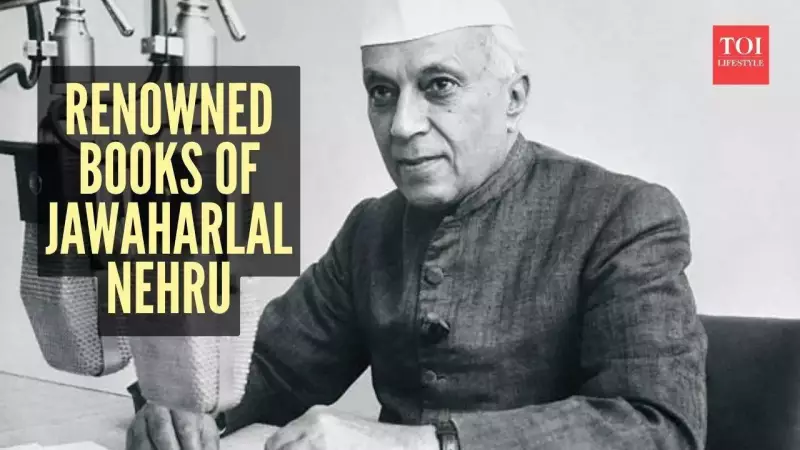
Jawaharlal Nehru, India's pioneering Prime Minister, left behind not just a political legacy but an extraordinary collection of writings that continue to illuminate minds decades after their creation. His books represent much more than historical accounts - they are profound explorations of India's soul, human civilization, and the very essence of progressive thinking.
The Visionary Writer Behind India's Freedom
What makes Nehru's literary works exceptional is the circumstances under which they were born. Most of his significant writing happened during his numerous imprisonments by British authorities, turning prison cells into studios of intellectual creation. His books seamlessly blend historical insight with moral reflection, creating timeless treasures of thought that continue to guide readers toward knowledge, curiosity, and empathy.
The Discovery of India: A Nation's Soul Unveiled
Written during his confinement at Ahmednagar Fort between 1942 and 1945, The Discovery of India stands as Nehru's most celebrated intellectual masterpiece. This monumental work represents his attempt to comprehend India's essence by tracing its philosophical roots, cultural evolution, and spiritual heritage from ancient times to the modern era.
Nehru begins his exploration with the origins of Indian civilization, examining how traditions like the Vedas, Upanishads, and Buddhism fundamentally shaped the Indian consciousness. His narrative beautifully intertwines historical facts with personal reflection, creating not just an academic study but an emotional journey through India's spiritual landscape.
The book powerfully challenges colonial narratives that portrayed India as stagnant and backward. Instead, Nehru presents a dynamic civilization that absorbed diverse influences - from Persian and Greek to Islamic and British - while maintaining its unique identity throughout centuries. His admiration for figures like Buddha, Ashoka, and Akbar underscores his belief in India's enduring traditions of tolerance and intellectual openness.
Beyond being a historical study, The Discovery of India serves as a political manifesto envisioning a free India that is democratic, inclusive, and deeply connected to its civilizational wisdom. Nehru's eloquent prose transforms historical analysis into a poetic expression of national pride, making the book both a meditation and a call for rediscovery in the light of freedom.
Glimpses of World History: A Father's Gift to His Daughter
Perhaps one of the most remarkable intellectual feats in literary history, Glimpses of World History comprises 196 letters written by Nehru to his young daughter Indira Gandhi between 1930 and 1933 while he was imprisoned. The extraordinary aspect of this work is that Nehru wrote entirely from memory, without access to reference materials, relying solely on his vast reading and exceptional recall.
The book takes readers on an epic journey from ancient civilizations of Egypt, Mesopotamia, Greece, and Rome through the Middle Ages, Renaissance, revolutions, and the emergence of modern nations. Nehru weaves a grand narrative of human progress, emphasizing how societies evolved through conflict, cooperation, and endless curiosity.
Nehru's purpose extends beyond mere historical recounting. He draws moral and philosophical lessons, highlighting the interconnectedness of world cultures and humanity's shared destiny. The book deliberately moves away from Eurocentric perspectives, emphasizing Asia's contributions and India's significant place in global history. Written in an affectionate, engaging tone, it represents a father guiding his daughter toward broader understanding of human struggles and achievements.
Glimpses of World History fundamentally reflects Nehru's internationalist worldview and his conviction that history represents human growth rather than merely a record of wars. It showcases his encyclopedic knowledge, rational perspective, and deep respect for freedom and human dignity, remaining a treasure trove of historical wisdom across generations.
An Autobiography: The Making of a Leader
Published in 1936 and also known as Toward Freedom, Nehru's autobiography offers a deeply personal account of his political awakening and intellectual journey. Written during his imprisonment in Almora Jail in 1934-35, the book traces his transformation from a privileged upbringing to becoming a central figure in India's independence movement.
Nehru begins with his early life in Allahabad, education at Harrow and Cambridge, and formative years in England where he encountered Western liberal and socialist ideas. His return to India brought him face-to-face with colonial realities and deep social inequalities, transforming him from a man of privilege into a passionate nationalist and disciple of Mahatma Gandhi.
The autobiography stands out for its remarkable honesty as Nehru critically examines his doubts, failures, and internal conflicts. He writes not as an infallible leader but as a human being - introspective, idealistic, and constantly questioning. His writing reveals his unique philosophy blending rationalism, humanism, and belief in collective progress.
Nehru documents his political journey through the Non-Cooperation Movement, multiple imprisonments, and growing conviction about socialism and democracy as India's future. The book's emotional authenticity shines through as he discusses feelings of loneliness, the burdens of leadership, and the challenges of imprisonment, all while maintaining an optimistic and intellectual tone throughout.
An Autobiography ultimately serves as both personal confession and political document, illustrating the evolution of a leader who integrated intellect with empathy, science with spirituality, and nationalism with humanism. It remains a classic commentary on freedom, self-discovery, and the moral responsibilities of leadership.
The Enduring Relevance of Nehru's Literary Legacy
Nehru's books continue to resonate with contemporary readers because they address fundamental questions about identity, freedom, and human progress. His ability to connect India's ancient wisdom with modern aspirations makes his writings perpetually relevant. Through these three masterpieces, Nehru established himself not just as a political leader but as one of India's most influential intellectual voices.
The Discovery of India helps readers understand the nation's cultural unity amid diversity, Glimpses of World History provides perspective on India's place in global context, and An Autobiography offers insights into leadership and personal transformation. Together, they form a literary trilogy that continues to inspire critical thinking, purposeful action, and deep appreciation for India's incredible journey through history.






